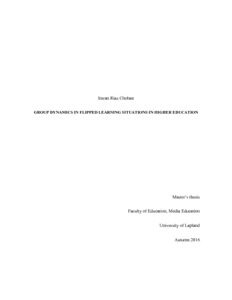Group dynamics in flipped learning situations in higher education
Chohan, Imran (2016)
Chohan, Imran
Lapin yliopisto
2016
openAccess
Julkaisun pysyvä osoite on
https://urn.fi/URN:NBN:fi:ula-201612071389
https://urn.fi/URN:NBN:fi:ula-201612071389
Tiivistelmä
Higher education has always been a firm supporter of traditional teacher oriented pedagogical approaches. However, reform of the pedagogical approaches is necessary in order to promote learning outcomes. In this research, the possibility of enhancing learning experiences and atmosphere among students and between students and tutor by group dynamic methods in flipped learning situations was investigated.
Reflection is a key component in learning and group dynamics. Thence, reflection’s essentiality with group dynamics in flipped learning is explained. Furthermore, to support the above argument, meaningful learning theory is discussed.
To undertake this research, mixed methods were used to analyse data retrieved with a questionnaire, reflections and observations, giving a diverse and comprehensive view of the subject. Data was collected from Lapland University students during flipped learning course in which group dynamics exercises had been integrated.
Two core changes are proposed; using facilitation methodologies (group dynamics) to make a new pedagogical framework to reform teaching in higher education, and introducing group dynamics to educators and students using flipped learning in order to improve learning outcomes and promote meaningful learning.
Reflection is a key component in learning and group dynamics. Thence, reflection’s essentiality with group dynamics in flipped learning is explained. Furthermore, to support the above argument, meaningful learning theory is discussed.
To undertake this research, mixed methods were used to analyse data retrieved with a questionnaire, reflections and observations, giving a diverse and comprehensive view of the subject. Data was collected from Lapland University students during flipped learning course in which group dynamics exercises had been integrated.
Two core changes are proposed; using facilitation methodologies (group dynamics) to make a new pedagogical framework to reform teaching in higher education, and introducing group dynamics to educators and students using flipped learning in order to improve learning outcomes and promote meaningful learning.
Kokoelmat
- Pro gradu -tutkielmat [4942]
